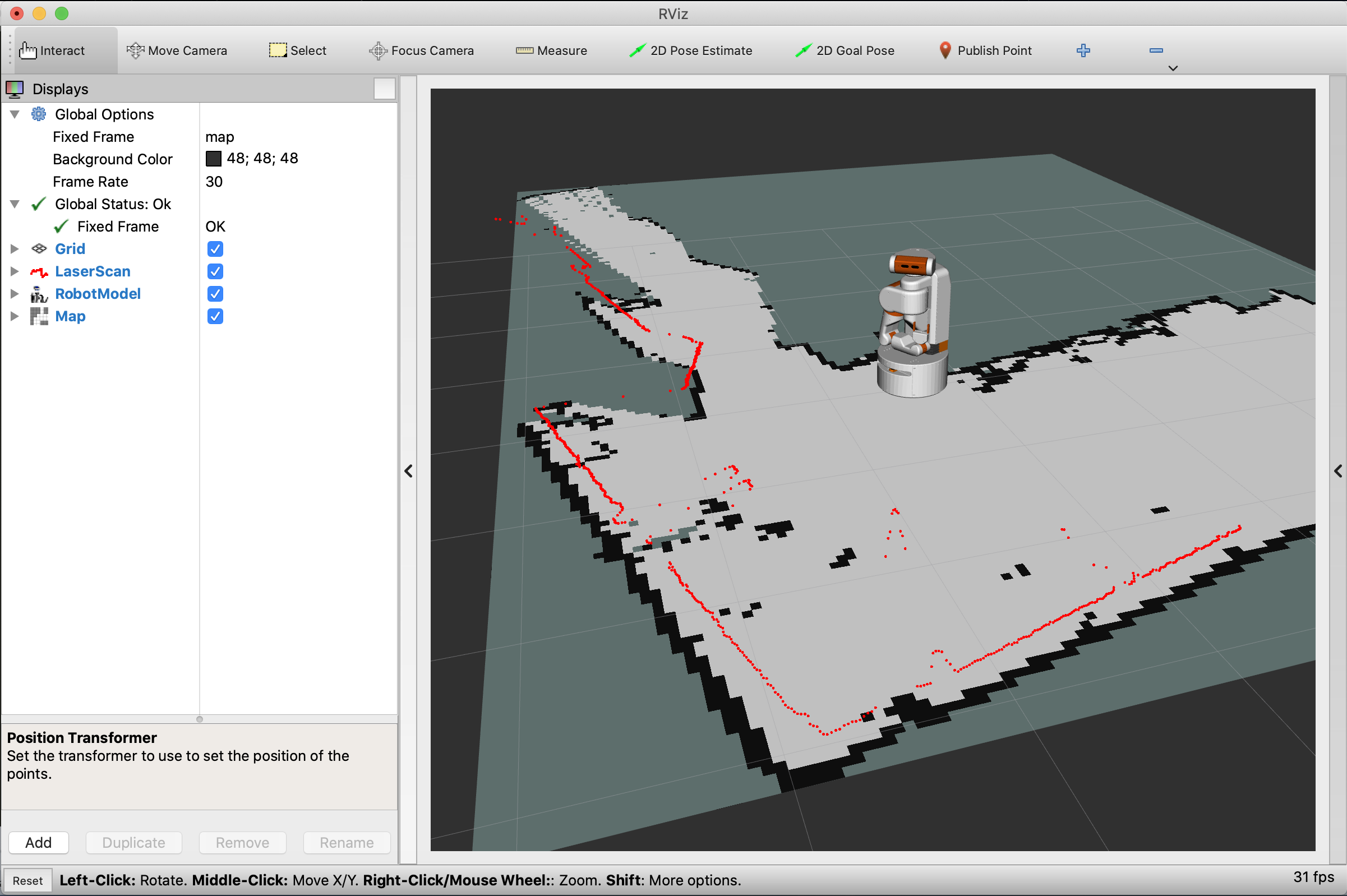ROS2 on MacOSX Catalina
10 Aug 2020robots ros2 
Back in 2014 or so, I had ROS1 running on my Mac. It took me a couple days to install and build dependencies. It was quite unstable. This weekend I got a new Macbook Pro (to replace my 2016 Macbook Pro, you know, the one with that great keyboard). I decided to also try setting up ROS2 on it, mainly for native RVIZ. It turned out to be somewhat straight-forward.
As a note, I really didn’t want to do too much mangling of my very nice and very new Macbook Pro - so I actually haven’t disabled System Integrity Protection. So far everything is working (with some caveats on workflow noted below).
First off, newer Macbooks are running Catalina (OSX 10.15) - which is not a
supported release. ROS2 (even the newest Foxy release) still targets OSX 10.14
Mojave. This means we absolutely have to build from source for Catalina.
I started by following the
from-source installation instructions.
I’d suggest going through the dependency installations listed there and
then applying the patches in the next several sections of this post
BEFORE actually running the colcon commands to build anything.

Installing XCode
The ROS2 instructions work for installing the XCode command line utilities, but it seems that I also needed to install XCode from the App store AND start the XCode GUI in order to finish the installation.
Some Paths
I had to add the following to my ~/.zshrc to get the various
visual tools to compile:
export Qt5_DIR=/usr/local/opt/qt5/lib/cmake
export PATH=/usr/local/opt/qt5/bin:$PATH
The end of /usr/include
One of the bigger changes in MacOSX Catalina is the removal of
/usr/include. Apparently the files have mostly moved to
/Library/Developer. As far as I could tell, this really only
affects the OGRE build - which needs access to various system header files.
The fix is to set CMAKE_OSX_SYSROOT:
colcon build --symlink-install --cmake-args CMAKE_OSX_SYSROOT=/Applications/Xcode.app/Contents/Developer/Platforms/MacOSX.platform/Developer/SDKs/MacOSX.sdk
I still had some build issues due to missing CoreFoundation,
which were fixed by this hack:
sudo cp /Library/Developer/CommandLineTools/SDKs/MacOSX10.15.sdk/System/Library/Frameworks/CoreFoundation.framework/Versions/A/Headers/* /Library/Developer/CommandLineTools/SDKs/MacOSX10.15.sdk/usr/include/CoreFoundation
RVIZ Crashes
I was super excited to see a laser scan show up on my Macbook! I then decided
to disable the laser scan and check out some other data - but RVIZ immediately
crashed. I spent a while debugging (even after looking through the issues
on GitHub) before realizing the fix I had come up with was already merged into
the ros2 branch, but not the foxy branch I was building. You’ll
want to run from the ros2 branch or at least include
PR #572 to really be able to use
RVIZ at all in MacOSX.
RQT Issues
Next I tried to run rqt_console - it wouldn’t run, giving me some
crazy trace about not finding RMW implements - but I had already tested the
Python demo nodes, so I knew that things were working there.
I eventually determined that I could run rqt and then load the
desired plugin. I haven’t gone back and debugged this more yet.
Autocomplete Issues
When I first installed things, I got the following warning when sourcing my workspace:
fergs@MacBook-Pro foxy % source install/setup.zsh
zsh compinit: insecure directories, run compaudit for list.
Ignore insecure directories and continue [y] or abort compinit [n]?
I accepted the insecure directories a number of times, but eventually got frustrated that autocomplete seemed to not be working. Finally, I started looking into it:
fergs@MacBook-Pro foxy % compaudit
There are insecure directories:
/usr/local/share/zsh/site-functions
/usr/local/share/zsh
Apparently the fix is quite simple. From stack overflow:
sudo chmod -R 755 /usr/local/share/zsh
Debugging with SIP Enabled
One challenge I did come across was that you can’t just run lldb
with ROS2 due to System Integrity Protection enabled. This is because the
default lldb executable is located in one of those key system
folders and so it strips off all the DYLD_LIBRARY_PATH stuff.
The workaround is actually pretty simple - use a different lldb, for instance:
/Applications/Xcode.app/Contents/Developer/usr/bin/lldb ~/foxy/install/rviz2/bin/rviz2
Remaining Issues

There are still a few issues to resolve:
- Dark mode has some issues - but I’ve opened a PR for that.
- RQT tools not loading without starting rqt first and selecting plugin really slows down workflow. This one might actually be related to still having System Integrity Protection enabled?